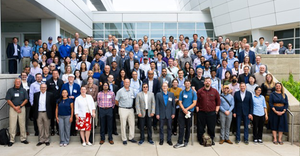Hot Sludge Funday
October 1, 2003
LOCAL GOVERNMENTS CANNOT restrict the land application of biosolids where a state agency has issued permits for such activity, according to a ruling by a federal appeals court. In the late summer of 2001, two residuals management firms filed separate applications with the Virginia Department of Health (VDH) for permits to apply biosolids to farmland in Appomattox County. Land application of treated biosolids (or sludge), as a cost-free substitute for commercially available fertilizer, is regulated by the U.S. Environmental Protection Agency and by state environmental authorities.
While these applications were pending, the county board held several public hearings and in early 2002, adopted two ordinances that, among other things, prohibited biosolids application in 80 percent of the county and generally outlawed above-ground application of sludge. Indeed, the board openly stated its “intent … to immediately impose a ban on land application of biosolids.”
In March 2002, VDH approved the permit applications. Thereafter, some 11 farms and farm operators in the county signed agreements with the permittees to apply biosolids to their fields. In late June, the farmers filed suit against the county in federal district court claiming that the ordinances were contrary to state and federal law. The plaintiffs sought a preliminary injunction prohibiting the county from enforcing the ordinances. After hearing the plaintiffs' witnesses and reviewing the exhibits offered by both sides, the district court issued an order blocking the county from enforcing the biosolids ordinances but allowing several general restrictions on land application of biosolids to remain in effect. [213 F.Supp.2d 627 (W.D.Va. Aug. 2, 2002)] The county appealed.
A three-judge panel of the U.S. Court of Appeals for the Fourth Circuit unanimously upheld the lower court ruling. The district court's findings of fact and legal conclusions were reasonable and its order was proper, the appellate panel determined.
The farmers “will suffer immediate, significant and acute irreparable harms if [the] injunction is denied,” the district court found. For its part, the county expressed concerns about odors and adverse health effects. “[T]he county's prospective fears are not as certain, identifiable or as severe as the damages claimed by the farmers and … the balance tips strongly in the farmers' favor,” said the appeals court.
“In light of the widespread use of biosolids in Virginia and elsewhere in the United States, the regulations and examinations undertaken by the Virginia General Assembly and the [EPA], and the studies by the scientific community, the fear of possible adverse health effects is too attenuated at this time to outweigh the likelihood of harm to the [f]armers,” the opinion said.
The case now goes back to the district court for trial and a final judgment on the legality of the ordinances. The appeals court noted that the farmers raised “serious, substantial” questions about the role of counties in regulating biosolids.
[O'Brien v. Appomattox County, No. 02-2019, 4th Cir., July 24, 2003]
The legal editor welcomes comments from readers. Contact Barry Shanoff via e-mail: [email protected].
The columnist is a Rockville, Md., attorney and serves as general counsel of the Solid Waste Association of North America.
About the Author
You May Also Like




